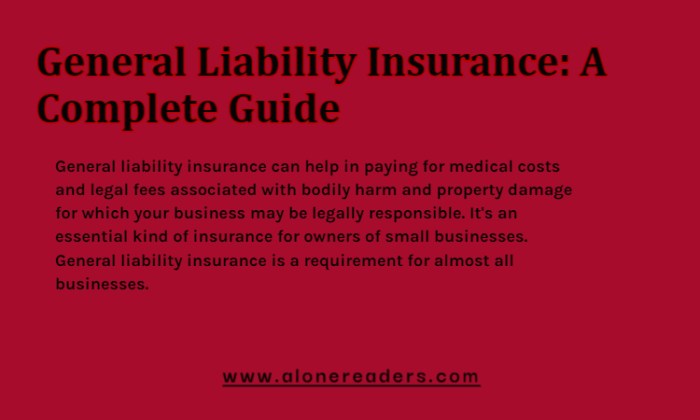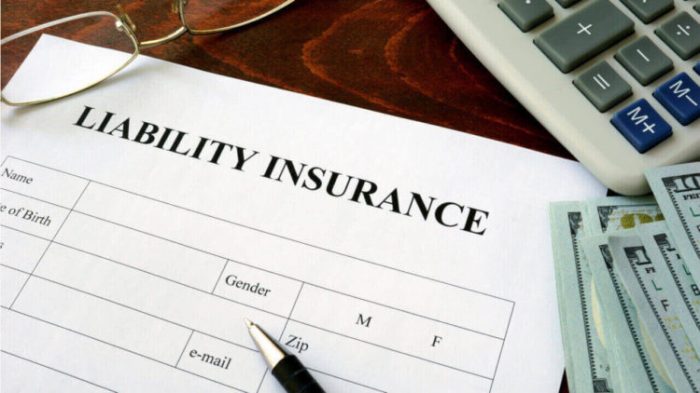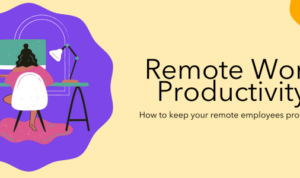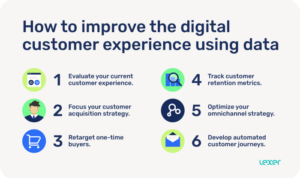Diving into the world of liability insurance guide, get ready for a crash course in protecting your business with the coolest coverage around. From legal requirements to best practices, we’ve got you covered.
Importance of Liability Insurance
Liability insurance is crucial for businesses as it provides financial protection in case of lawsuits or claims filed against the company. It helps cover legal expenses, settlements, and damages, which can be significant and potentially devastating for a business.
Protection in Various Situations
Liability insurance can protect a business in various situations, such as:
- Accidents on business premises: If a customer slips and falls in your store, liability insurance can cover medical expenses and legal fees.
- Product liability claims: If a product causes harm to a customer, resulting in a lawsuit, liability insurance can help cover the costs.
- Professional errors: For service-based businesses, liability insurance can protect against claims of negligence or mistakes in services provided.
Legal Requirements in Different Industries
Many industries have legal requirements for liability insurance to operate legally. For example:
- Construction industry: Contractors are often required to have liability insurance to protect against property damage or injuries on worksites.
- Healthcare sector: Medical professionals are typically required to carry malpractice insurance to protect against claims of medical negligence.
- Food industry: Restaurants and food manufacturers may need liability insurance to cover claims related to foodborne illnesses or allergic reactions.
Types of Liability Insurance
When it comes to liability insurance, there are several types available to cater to different needs and situations. Let’s take a closer look at the main types of liability insurance and the coverage they provide.
General Liability Insurance
General liability insurance is designed to protect businesses from a variety of risks, such as bodily injury, property damage, and advertising injury. It typically covers legal fees, medical expenses, and damages resulting from lawsuits.
Professional Liability Insurance
Professional liability insurance, also known as errors and omissions insurance, is essential for professionals who provide services or advice. It covers claims of negligence, errors, or omissions that may arise from the services provided.
Product Liability Insurance
Product liability insurance is crucial for businesses that manufacture, distribute, or sell products. It protects against claims of injury or property damage caused by a faulty product.
Comparison of Coverage, Liability insurance guide
- General liability insurance provides coverage for bodily injury, property damage, and advertising injury.
- Professional liability insurance covers claims of negligence, errors, or omissions related to services provided.
- Product liability insurance protects against claims of injury or property damage caused by a faulty product.
Examples of Businesses
- A construction company may need general liability insurance to protect against accidents on work sites.
- Consultants and lawyers may require professional liability insurance to safeguard against claims of professional negligence.
- A manufacturer of electronic devices would benefit from product liability insurance to mitigate risks associated with product defects.
Factors to Consider When Choosing Liability Insurance

When selecting a liability insurance policy for your business, there are several key factors that should be taken into consideration to ensure you are adequately protected. The size and nature of your business play a significant role in determining the type and amount of liability insurance you need. Additionally, factors such as deductibles, coverage limits, and premiums also play a crucial role in choosing the right liability insurance policy.
Size and Nature of Business
The size and nature of your business are important factors to consider when choosing liability insurance. A larger business with more employees and higher revenues may require a more comprehensive liability insurance policy to protect against potential risks. Likewise, the nature of your business, including the industry you operate in and the specific risks associated with your operations, will impact the type of liability coverage you need. It’s essential to assess the unique risks your business faces to determine the appropriate level of coverage.
Deductibles, Coverage Limits, and Premiums
When selecting a liability insurance policy, it’s crucial to consider the deductibles, coverage limits, and premiums associated with the policy. Deductibles are the amount you must pay out of pocket before your insurance coverage kicks in, so it’s essential to choose a deductible that aligns with your budget and risk tolerance. Coverage limits determine the maximum amount your insurance company will pay for a covered claim, so it’s important to select coverage limits that adequately protect your business against potential liabilities. Premiums, or the cost of the insurance policy, should also be considered to ensure it fits within your budget while providing the necessary coverage for your business.
Claims Process for Liability Insurance: Liability Insurance Guide
When it comes to filing a liability insurance claim, there are specific steps that businesses need to follow to ensure a smooth process. It is essential for businesses to be prepared and organized when filing a claim to maximize their coverage and expedite the process.
Steps Involved in Filing a Liability Insurance Claim
- Gather all relevant information: Collect all details related to the incident, including documentation, photos, and witness statements.
- Contact your insurance provider: Notify your insurance company as soon as possible to initiate the claims process.
- Submit a claim form: Fill out the necessary paperwork provided by your insurance company to formally file the claim.
- Cooperate with the investigation: Your insurance provider may conduct an investigation to assess the validity of the claim.
- Review the settlement: Once the investigation is complete, review the settlement offer and negotiate if needed.
What Businesses Need to Prepare When Filing a Claim
- Detailed incident report: Provide a detailed account of the incident leading to the claim.
- Documentation: Keep all relevant documentation, such as medical records, repair estimates, and financial statements.
- Communication records: Maintain records of all communication with your insurance company regarding the claim.
- Legal representation: Consider seeking legal advice to ensure your rights are protected during the claims process.
Tips to Expedite the Claims Process and Maximize Coverage
- Act promptly: Notify your insurance provider as soon as the incident occurs to avoid delays in the claims process.
- Be thorough: Provide all necessary information and documentation to support your claim effectively.
- Stay organized: Keep all records and communications related to the claim in one place for easy reference.
- Follow up: Stay in touch with your insurance company to track the progress of your claim and address any concerns promptly.
- Seek assistance: Consider consulting with a claims adjuster or legal expert to navigate the complexities of the claims process.
Liability Insurance Best Practices

When it comes to managing liability insurance for your business, there are several best practices to keep in mind to ensure you are effectively protected. By implementing these strategies, you can reduce your liability risks and potential claims, ultimately safeguarding your business and its assets.
Regular Policy Review
Regularly reviewing and updating your liability insurance policies is crucial to ensure you have adequate coverage for your business needs. As your business grows and evolves, your liability risks may change, making it essential to review your policies to make any necessary adjustments. By staying up to date with your coverage, you can avoid gaps in protection that could leave your business vulnerable in the event of a claim.
Risk Management Strategies
Implementing strong risk management strategies is key to reducing liability risks and potential claims. This includes identifying and addressing potential hazards in your business operations, implementing safety protocols, and providing employee training to minimize the likelihood of accidents or incidents that could lead to liability claims. By proactively managing risks, you can lower the chances of facing costly claims and protect your business from financial harm.
Working with an Expert
Working with an insurance expert or broker can help ensure you have the right liability coverage for your business. An experienced professional can assess your specific risks, recommend appropriate coverage options, and help you navigate the complexities of liability insurance policies. By partnering with an expert, you can gain valuable insights and guidance to make informed decisions about your insurance needs, ultimately maximizing your protection and minimizing potential risks.





